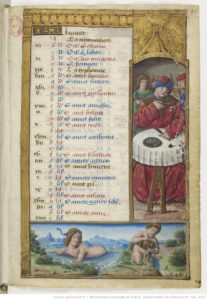
“January”, kalendar page from Les Petites Heures d’Anne de Bretagne (The Little Hours of Queen Anne of Bretagne), by the Maître des Triomphes de Pétrarque. From Bibliothèque nationale de France, Paris (France).
Hilary was an ardent Trinitarian, and he spent a good deal of his career fighting Arianism, the doctrine espoused by Arius of Alexandria in Egypt, which held that Jesus was not co-eternal with God, but was created by God, and therefore subordinate to God. (To get technical, Arians were homoiousian, or homoeanist, or heteroousian, but not homoousian, as advocated by Athanasius, Nicholas, and Hilary.) Hilary wrote extensively on the topic, most notably his twelve-volume De trinitate (“On the Trinity”). He also wrote an allegorical exegesis of the Gospel according to Matthew, and commentaries on the psalms.
Hilary encouraged Martin, the future bishop of Tours, to found a monastery at Ligugé. He also impeached Axuentius, bishop of Milan, as heterodox, but Emperor Valentinian I found the charges unsubstantiated; Hilary denounced Auxentius as a hypocrite as he himself was expelled from Milan.
Hilary was recognized by Augustine of Hippo as “the illustrious doctor of the churches”, and Pope Pius IX formally recognized Hilary as a Doctor of the Universal Church in 1851.
Hilary’s feast day is January 13. (For a few centuries it was moved to January 14 to avoid a conflict with the Octave of the Epiphany. When Epiphany lost its octave in the GRC reform of 1970, Hilary was restored to the 13th.) The spring terms of the English and Irish Law Courts, and of Oxford and Dublin Universities, are called the Hilary term, because they begin approximately on Hilary’s feast date.


